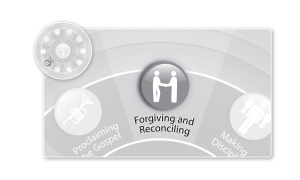Part XI of the Forgiving and Reconciling Series
 Which comes first: forgiveness or repentance?
Which comes first: forgiveness or repentance?
If that is a little too abstract, let me ask it like this: when someone sins against you, which comes first? Forgiveness or repentance?
In practice, we Christians will often give an answer based on a human understanding of forgiveness. As we talked about previously, that human understanding sees forgiveness as a change in…
- Feeling, like moving from hurt to acceptance, or
- Memory, like moving from dwelling on the sin to forgetting about it, or
- Will, like trying our hardest to rebuild (or get along without) what the sinner broke in our relationship through his or her sin.
And when we think about forgiveness in this human way, we’ll usually say something like:
“Of course their repentance needs to come first. They need to know what they did wrong and show that they’re genuinely sorry. They need to make an effort to change. Otherwise I’ll get taken advantage of, and the same thing will happen over and over again.”
So in our human understanding, forgiveness is the result of repentance.
But as we’ve been learning, God’s forgiveness is very, very different than humans’ understanding of forgiveness. God’s forgiveness is aphesia in the Greek—release from bondage. And it’s nasa’ in the Hebrew—bearing or carrying away. Put those together and you get:
In Christ, God makes possible our release from the bondage of sin by bearing the sin himself.
This means that with God, repentance is made possible by forgiveness, not the other way around. In fact, his forgiveness is the only thing that makes repentance possible.
Now this whole subject creates all kinds of disagreements and conflicts (ironically) among good, well-meaning Christians. And it’s easy to understand why, because one group (like ours) will say:
“Yes, forgiveness is what makes repentance possible. That’s why on the cross in Luke 23:34 Jesus says, ‘Father, forgive them, for they know not what they’re doing.’ And that’s why when Stephen is being stoned in Acts 7:60, he says, ‘Lord, do not lay this sin to their charge.’ And it’s why Paul says in Romans 5:8, ‘But God demonstrates his own love for us in this: While we were still sinners, Christ died for us.’ Without forgiveness, repentance is simply not possible.”
But then the other group will say:
“Yeah, but what about in Luke 17:3, where Jesus says, ‘If your brother or sister sins against you, rebuke them; and if they repent, forgive them’? You can’t get much more straightforward than that, right? And if God forgives everybody, are you saying that nobody goes to hell?”
Well, we love that ‘other group’. But they are wrong, you know.
Plenty of people go to hell, but not because God refuses to forgive them. That idea—that God refuses to forgive until we repent, and that we are to act the same way with people who sin against us—is a grave misunderstanding of both God’s understanding of forgiveness and God’s understanding of sin.
Both of which we’ll be looking at in our next post.











Pingback: Should We Forgive the Unrepentant? | Do the Word
It’s kinda hard to acknowledge the greatness in and of ourselves when the very issues spoken of are the very tenants of the greatest contention in our own families. Scripture is replete with the direction that repentance be most apparent in order for the acquisition of forgiveness by the same. What is apparent is that all want forgiveness (because I/them are brothers and sisters) but bugger all repentance to speak. As I toil over these very tenants of righteousness into the weee weee hours nights for the past 4 months, I wonder if I am just wasting my time and effort weith family who just want at the expense of the other?
Dear Eriha,
I can certainly relate to your situation! I also have a family member with whom I have a difficult relationship. I have forgiven them, but they do not want to acknowledge what they did. It seems to be a pattern for people in this situation to say, “I didn’t do anything, but if you think I did something, you need to forgive and then we can move on.”
It is important that the other people know that we do forgive them, but I do not think we should give into the temptation to let them continue to lie and say that nothing happened; this will not make for a healthy relationship, although it may make life easier for the other person.
It is difficult to understand this kind of situation, let alone to say, “We should do this” or “This is the right thing to do.”
However, what do you think is the best way to both mirror God’s forgiveness, which we first received and are held responsible for passing on, while not letting a relationship be built on a lie?
Thank you for your expert input on abuse with this practical resource!